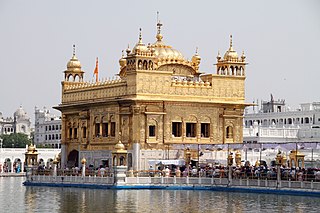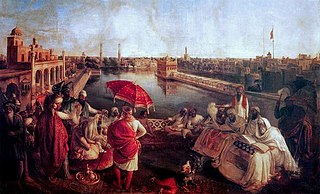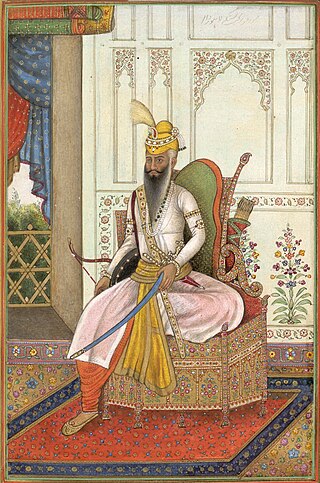
Sikhism, also known as Sikhi, is a monotheistic religion and philosophy, that originated in the Punjab region of India around the end of the 15th century CE. Sikhism is classified as an Indian religion or Dharmic religion along with Buddhism, Hinduism, and Jainism. It is one of the most recently founded major religious groups and among the largest in the world with about 25–30 million adherents.

Sikhs are an ethnoreligious group who adhere to Sikhism, a religion that originated in the late 15th century in the Punjab region of the Indian subcontinent, based on the revelation of Guru Nanak. The term Sikh has its origin in the Sanskrit word śiṣya, meaning 'seeker', 'disciple' or 'student'.

Ranjit Singh, popularly known as Sher-e-Punjab or "Lion of Punjab", was the first Maharaja of the Sikh Empire, which ruled the northwest Indian subcontinent in the early half of the 19th century. He survived smallpox in infancy but lost sight in his left eye. He fought his first battle alongside his father at age 10. After his father died around Ranjit's early teenage years, Ranjit subsequently fought several wars to expel the Afghans throughout his teenage years. At the age of 21, he was proclaimed the "Maharaja of Punjab". His empire grew in the Punjab region under his leadership through 1839.

Khalsa refers to both a community that considers Sikhism as its faith, as well as a special group of initiated Sikhs. The Khalsa tradition was initiated in 1699 by the Tenth Guru of Sikhism, Guru Gobind Singh. Its formation was a key event in the history of Sikhism. The founding of Khalsa is celebrated by Sikhs during the festival of Vaisakhi.

Religious segregation is the separation of people according to their religion. The term has been applied to cases of religious-based segregation which occurs as a social phenomenon, as well as segregation which arises from laws, whether they are explicit or implicit.

The Rohingya people are a stateless Indo-Aryan ethnic group who predominantly follow Islam and reside in Rakhine State, Myanmar. Before the Rohingya genocide in 2017, when over 740,000 fled to Bangladesh, an estimated 1.4 million Rohingya lived in Myanmar. Described by journalists and news outlets as one of the most persecuted minorities in the world, the Rohingya are denied citizenship under the 1982 Myanmar nationality law. There are also restrictions on their freedom of movement, access to state education and civil service jobs. The legal conditions faced by the Rohingya in Myanmar have been compared to apartheid by some academics, analysts and political figures, including Nobel laureate Bishop Desmond Tutu, a South African anti-apartheid activist. The most recent mass displacement of Rohingya in 2017 led the International Criminal Court to investigate crimes against humanity, and the International Court of Justice to investigate genocide.
Guru Nanak founded the Sikh religion in the Punjab region of the northern part of the Indian subcontinent in the 15th century and opposed many traditional practices like fasting, Upanayana, idolatry, caste system, ascetism, azan, economic materialism, and gender discrimination.

Since its independence in 1947, India has accepted various groups of refugees from neighbouring countries, including partition refugees from former British Indian territories that now constitute Pakistan and Bangladesh, Tibetan refugees that arrived in 1959, Chakma refugees from present day Bangladesh in early 1960s, other Bangladeshi refugees in 1965 and 1971, Sri Lankan Tamil refugees from the 1980s and most recently Rohingya refugees from Myanmar. In 1992, India was seen to be hosting 400,000 refugees from eight countries. According to records with the Union Ministry of Home Affairs, as on January 1,2021, there were 58,843 Sri Lankan refugees staying in 108 refugee camps in Tamil Nadu and 54 in Odisha and 72,312 Tibetan refugees have been living in India.
Awtar Singh or Awtar Singh Khalsa was an Afghan politician. He was the Sikh representative to the Loya Jirga from Paktia Province. He was the only non-Muslim representative there. His native tongue was Punjabi. He was in charge of the main Sikh temple (Gurdwara) in Kabul.

A Jatha is an armed body of Sikhs that has existed in Sikh tradition since 1699, the beginning of the Khalsa. A Jatha basically means a group of people.

Sikhism inAfghanistan in the contemporary era is limited to small populations, primarily in major cities, with the largest numbers of Afghan Sikhs living in Jalalabad, Ghazni, Kabul, and to a lesser extent in Kandahar and Khost. Sikhs have been the most prevalent non-Muslim minority in Afghanistan, and despite the many political changes in recent Afghan history, governments and political groups have generally not indulged in openly discriminating against the Sikh minority; however, their status have been severely impacted amid the country's conflict since 1978.

The Singh Sabhā Movement, also known as the Singh Sabhā Lehar, was a Sikh movement that began in Punjab in the 1870s in reaction to the proselytising activities of Christians, Hindu reform movements and Muslims. The movement was founded in an era when the Sikh Empire had been dissolved and annexed by the British, the Khalsa had lost its prestige, and mainstream Sikhs were rapidly converting to other religions. The movement's aims were to "propagate the true Sikh religion and restore Sikhism to its pristine glory; to write and distribute historical and religious books of Sikhs; and to propagate Gurmukhi Punjabi through magazines and media." The movement sought to reform Sikhism and bring back into the Sikh fold the apostates who had converted to other religions; as well as to interest the influential British officials in furthering the Sikh community. At the time of its founding, the Singh Sabha policy was to avoid criticism of other religions and political matters.

Jammu is a city in Indian-administered Jammu and Kashmir in the disputed Kashmir region. It is the winter capital of Jammu and Kashmir, which is an Indian-administered union territory. It is the headquarters and the largest city in Jammu district. Lying on the banks of the river Tawi, the city of Jammu, with an area of 240 km2 (93 sq mi), is surrounded by the Himalayas in the north and the northern plains in the south. Jammu is the second-most populous city of the union territory. Jammu is known as "City of Temples" for its ancient temples and Hindu shrines.

In 2015, hundreds of thousands of Rohingya people were forcibly displaced from their villages and IDP camps in Rakhine State, Myanmar, due to sectarian violence. Nearly one million fled to neighbouring Bangladesh and some travelled to Southeast Asian countries including Malaysia, Indonesia, Cambodia, Laos and Thailand by rickety boats via the waters of the Strait of Malacca, Bay of Bengal and the Andaman Sea.
An illegal immigrant in India is a foreigner who has entered India either without valid documents or who initially had a valid document, but has overstayed beyond the permitted time, as per the general provisions of the Citizenship Act as amended in 2003. Such persons are not eligible for citizenship by registration or naturalisation. They are also liable to be imprisoned for 2–8 years and fined.

The Rohingya genocide is a series of ongoing persecutions and killings of the Muslim Rohingya people by the military of Myanmar. The genocide has consisted of two phases to date: the first was a military crackdown that occurred from October 2016 to January 2017, and the second has been occurring since August 2017. The crisis forced over a million Rohingya to flee to other countries. Most fled to Bangladesh, resulting in the creation of the world's largest refugee camp, while others escaped to India, Thailand, Malaysia, and other parts of South and Southeast Asia, where they continue to face persecution. Many other countries consider these events ethnic cleansing.

Kutupalong refugee camp is the world's largest refugee camp. It is located in Ukhia, Cox's Bazar, Bangladesh, and is inhabited mostly by Rohingya refugees who fled from ethnic and religious persecution in neighboring Myanmar. It is one of two government-run refugee camps in Cox's Bazar, the other being the Nayapara refugee camp.

On 25 August 2017, Hindu villages in a cluster known as Kha Maung Seik in the northern Maungdaw District of Rakhine State in Myanmar were attacked and 99 Bengali Hindu villagers were massacred by Muslim insurgents from the Arakan Rohingya Salvation Army (ARSA). A month later, the Myanmar Army discovered mass graves containing the corpses of 45 Hindus, most of whom were women and children.

Ravinder "Ravi" Singh is a British humanitarian and founder and CEO of the Sikh international non-profit aid and relief organization Khalsa Aid.
















